Study shows alcohol impacts men and women differently.
When we think of problem or binge drinking, the face is likely male. Males are generally categorized as more likely to engage in high risk behavior like binge drinking and thesocial pressure for men to drink is high. Think about the stereotypical men’s social activities: watching a game, playing golf or having “beers with the boys.” Alcohol seems to be just a part of men’s social lives. But is alcohol becoming the next big women’s health issue? Alcoholmarketing targeting womenhas ramped up in the past decade, especially in the hard seltzer category.
The hard seltzer market was$1.8B in 2020and is poised to grow 35% in 2021. These products target an audience that is young, health-conscious, looking for low-calorie or low-carb options that aren’t beer. It’s also largely female. Early category entrantstargeted women, sometimes exclusively, with thin, tall cans and colorful designs (even using mermaids or florals). This attractive packaging became popular among young women, especially when combined with the “Instagram-ability” of the product.
These trends — the increase in marketing and growth in the market — are fueling fears that problem drinking is now being normalized for women. Alcohol-related deaths for white womenmore than doubledduring the period from 1999-2015.
As a behavioral health provider, we regularly conduct research on mental health and substance use, includingalcohol use disorderandalcohol addiction, to better understand the current landscape and trends in these areas. Werecently conducted a surveyto learn more about how alcohol impacted different aspects of the participants’ lives. We found that in addition to reporting widespread physical and mental health symptoms, men and women experienced theeffects of alcoholism, including attitudes toward getting help and relapse rates, differently.
Treatment Can Be Life Changing. Reach out today.
Whether you are struggling with addiction, mental health or both, our expert team is here to guide you every step of the way. Don’t wait— reach out today to take the first step toward taking control of your life.
Note: the collection tool does not identify non-binary gender in respondents. Results will be discussed based on the gender selected by the participants. This is a limitation, as there isevidencethat this is a disproportionate issue in gender minority groups.
The Recovery Village Survey Results
We surveyed more than 2,000 Americans who had attempted to stop drinking (successfully or not) or wanted to stop to learn more about their experience with alcohol and how it impacted different aspects of their lives. Note: Some questions asked respondents to select each option that applied, so in a few instances, the total percentage will be greater than one hundred.
Participants were first asked how frequently they drank in a typical 30 day period and how many drinks they consumed on a typical day. Men reported drinking more and more often. They were:
- 44% more likely to report drinking every day
- 39% more likely to report drinking 5-6 times per week
- 27% more likely to drink 5-6 drinks in a typical day
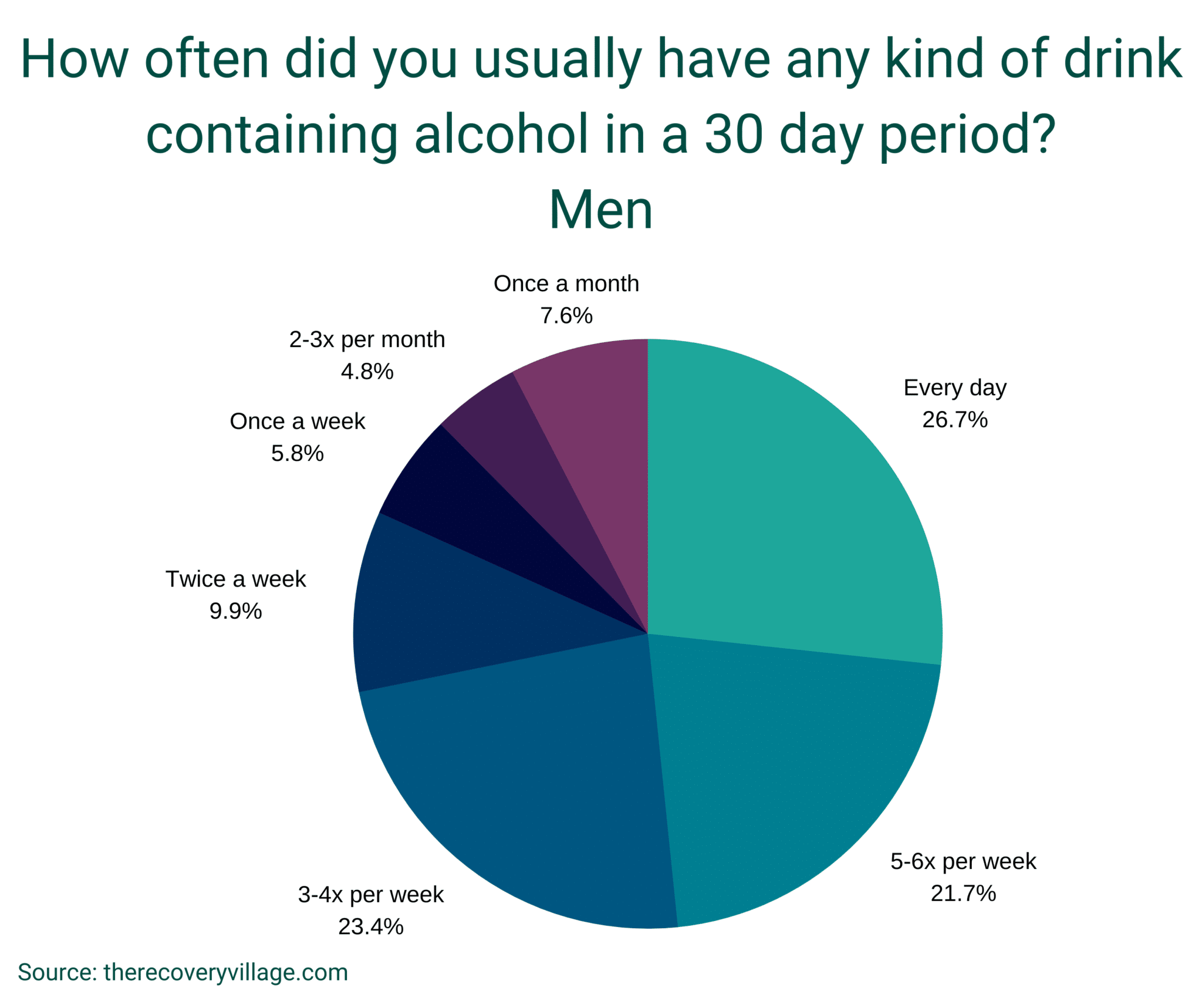
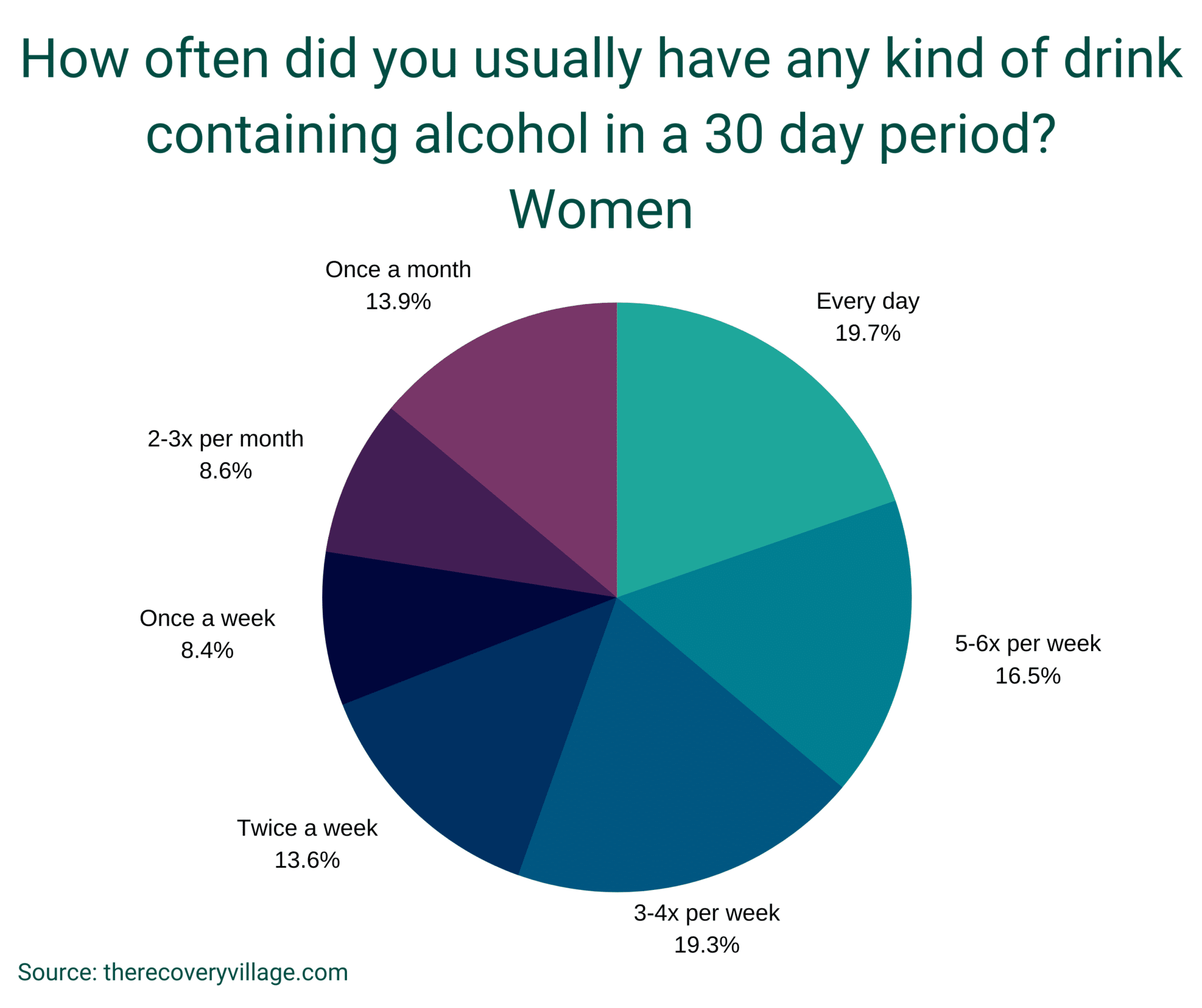
Men were also much more likely to binge drink. Binge drinking is defined by consuming five or more drinks (for men) or four or more drinks (for women) in a 2-hour period. Men were:
- 64% more likely to say every day
- 81% more likely to say 5-6 days per week
- 33% more likely to say 3-4 days per week
Meanwhile, women were 31% more likely to report binge drinking just once a week, 72% more likely to binge just two to three times per month and 129% more likely to report binge drinking less than once per month.
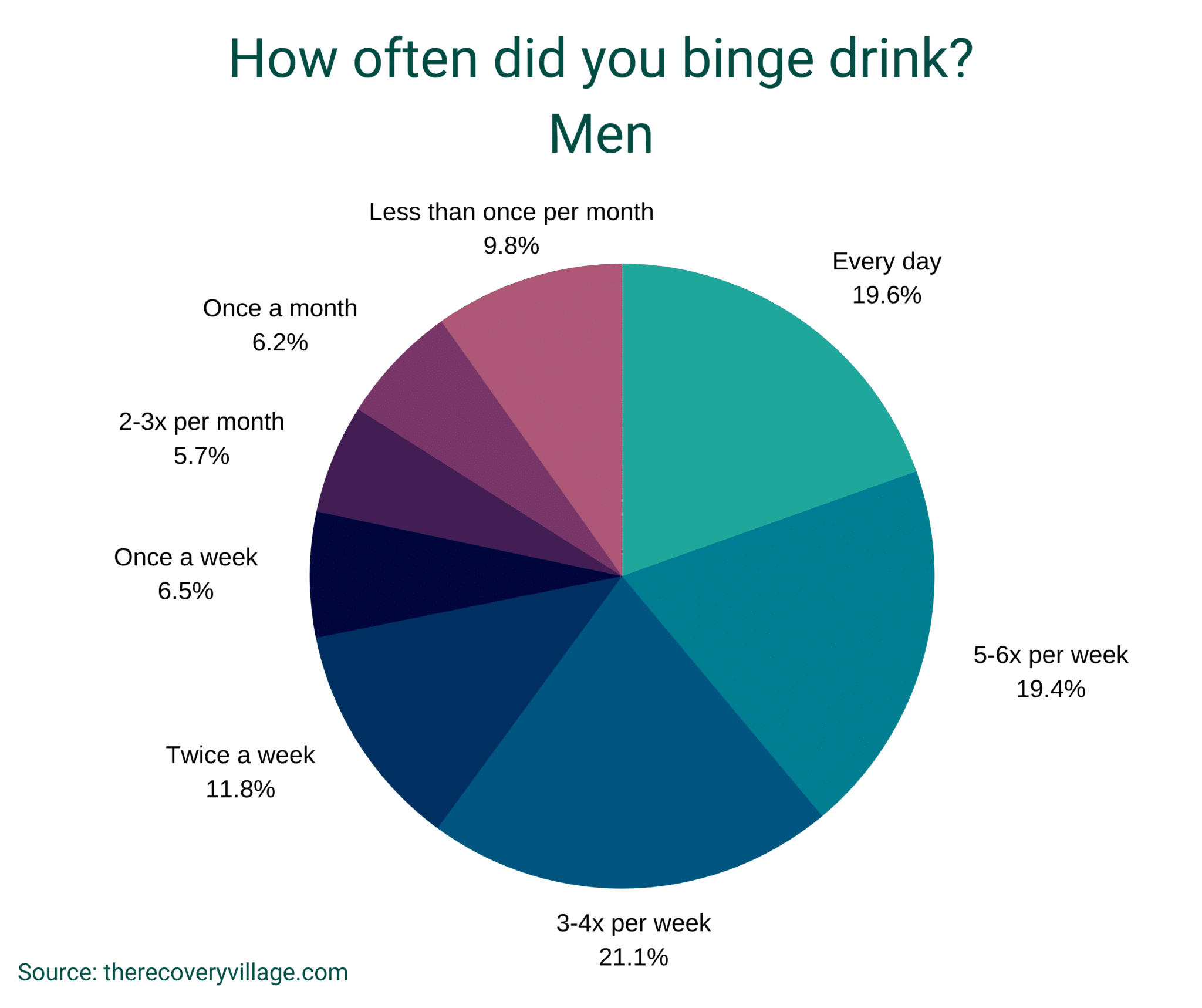
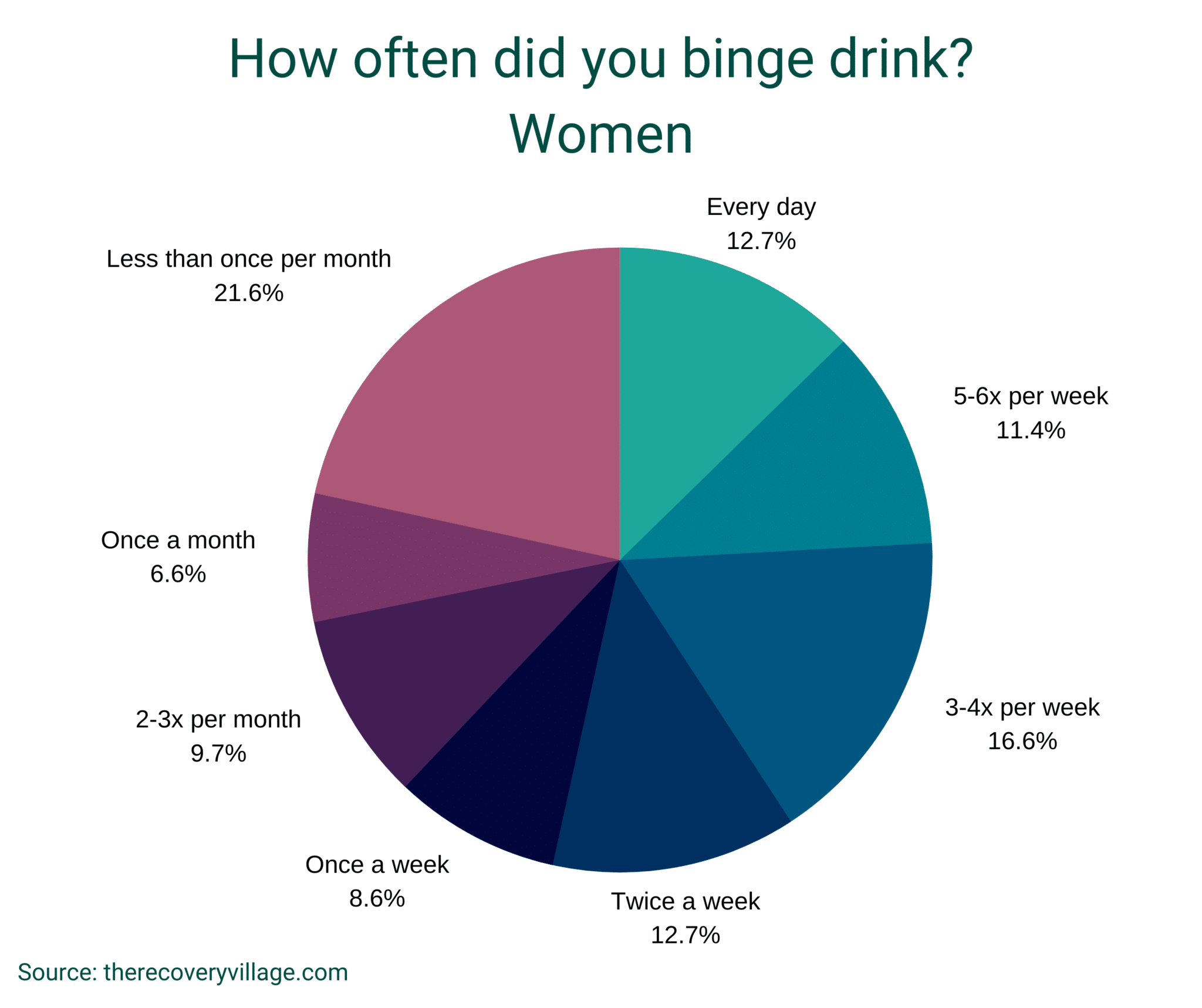
We also asked respondents about the reasons why they drank. A majority of both groups (58%) said coping with stress, which included things like relaxing, unwinding, dealing with difficult issues. We noticed some interesting differences in the factors reported between men and women.
- Men were 74% more likely to report being physically dependent on alcohol.
- Men were also 21% more likely to say coping with mental health symptoms (like anxiety or depression).
- Women were 17% more likely to say they drank for recreational or social reasons.
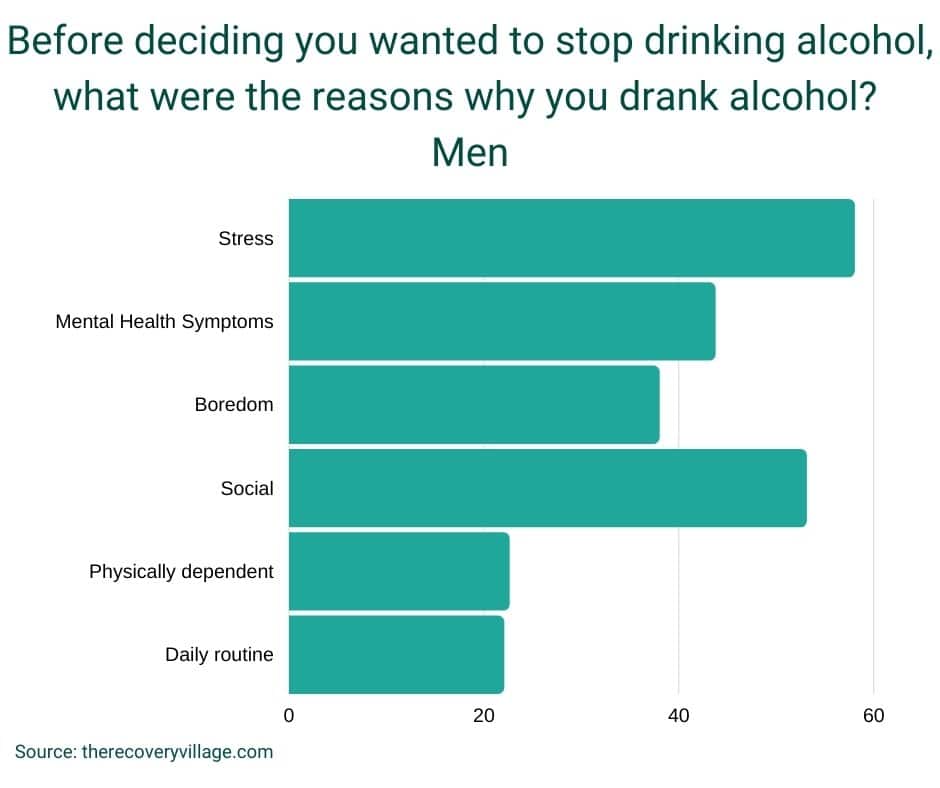
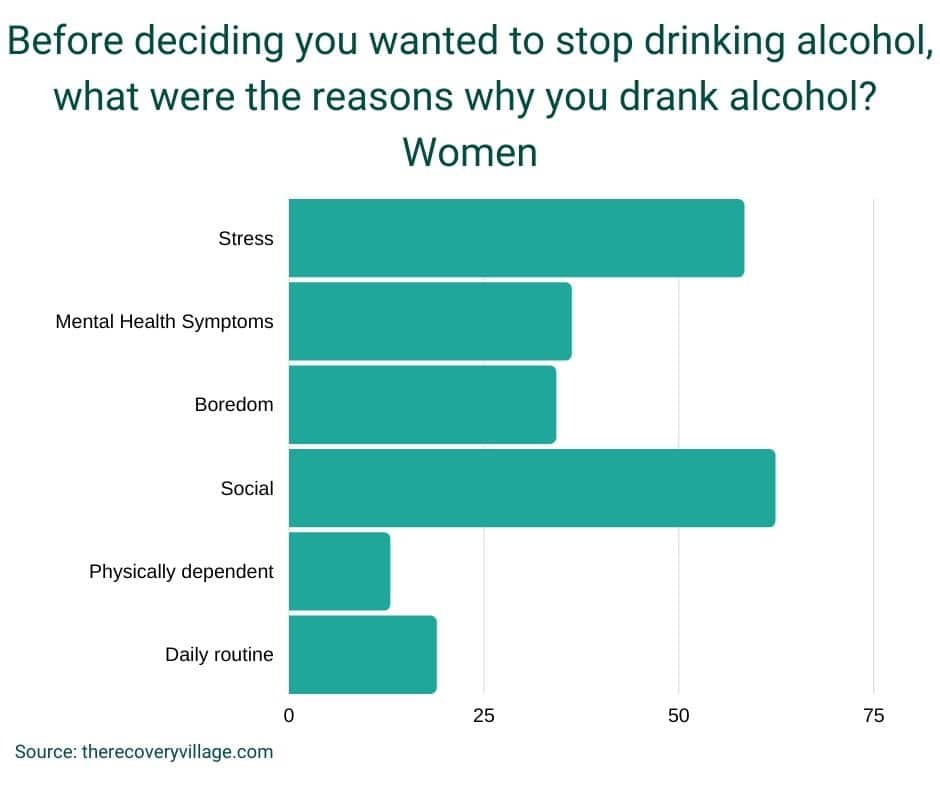
These results could point to a need to give men more resources and space to take care of their mental and physical health. For women, it might be an opportunity to revisit the “wine mommy” narrative that’s become popularized in our culture and encourage women to also consider other ways to socialize and have fun with each other.
Alcohol’s Impact on Participants’ Lives
Next we wanted to know more about the impact of their alcohol use on different aspects of the participants’ lives. Once again, we noticed big differences in the effects experienced by men compared to women.
- Men were 47% more likely to say their drinking had an impact on their legal status.
- Men were 40% more likely to say their drinking affected their career.
- Men were 22% more likely to say their drinking affected their abilities as a parent.
Men were also much more likely to report adverse health complications. They were:
- 72% more likely to report liver disease
- 64% more likely to report cancer
- 62% more likely to report cirrhosis
- 45% more likely to report high blood pressure
- 43% more likely to report cardiovascular disease
- 20% more likely to report depression
In fact, women were 65% more likely to report that they didn’t experience any of these conditions.
These stats are especially concerning when studies by the CDC and NIH also show that historically, men areless likely to go to the doctorthan women and when they do go, theyreceive less of the doctor’s timeand are provided with fewer and briefer explanations. All of these results combine to suggest that men’s health is an important area with much room for improvement to meet the needs of this population.
Differences in Approach to Detox, Rehab & Recovery
For those who had attempted to stop drinking, successfully or not, we wanted to better understand barriers to treatment, the treatment experience and what happens after treatment. We found that men were much more likely than women to seek outside help to quit drinking.
- Men were 124% more likely to consider professional addiction treatment (alcohol rehab).
- Women were 112% more likely to say they did not or would not consider using outside help to quit drinking.
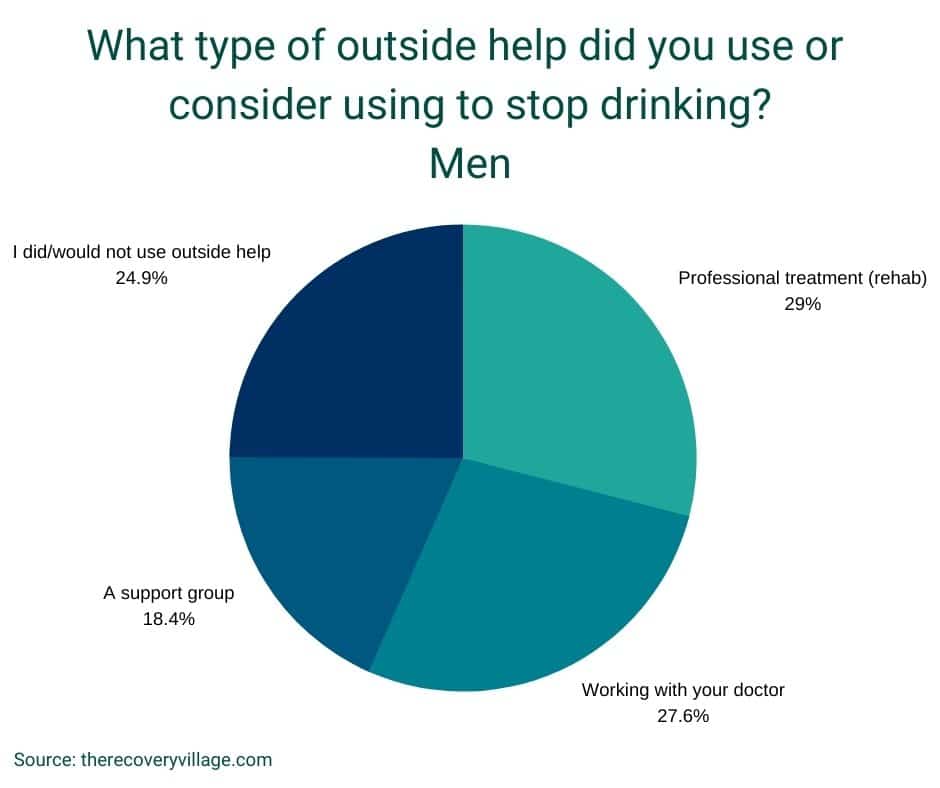
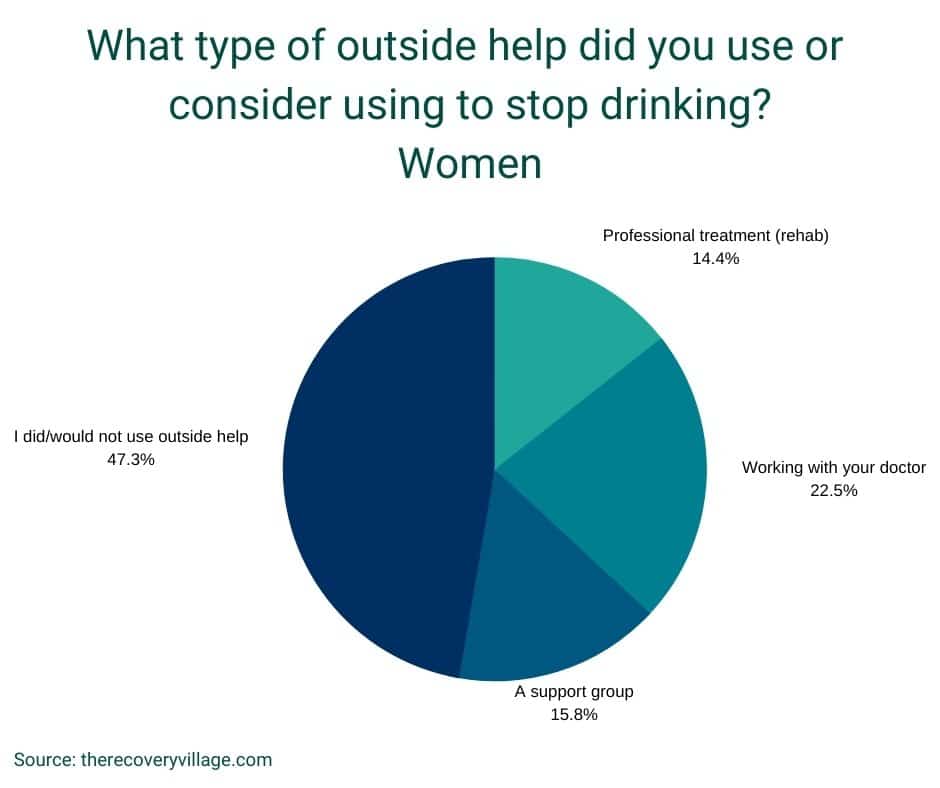
Our own admissions records align with these findings. Of our admissions for alcohol through mid-April 2021, 68.5% were men and 31.5% were women. This discrepancy could point toward women fearing or experiencing increasedsocial stigma or discomfortdiscussing sensitive traumatic events in a co-ed setting.
Women were also much more likely (72%) to say they never relapsed since receiving treatment or stopping alcohol use. A relapse is defined by a return to oldalcohol abusebehaviors. Men were 253% more likely to experience a relapse within the first two years compared to women.
- 37% of men relapsed within the first year
- 25% of men relapsed between one and two years
- 39% of women said they have never relapsed
Alcohol is a substance that has potentially lethal withdrawal symptoms. Working with a professional can not only make the alcohol detox process more comfortable, it can ensure your safety. With more men reporting heavy alcohol use, it’s encouraging that they are most open to professional help since heavy use also increases the likelihood that they’ll experience withdrawal symptoms during detox. However, it’s concerning that more women aren’t open to considering outside help.
Even if your detox isn’t necessarily life-threatening, you don’t have to experience it alone. Thebenefits of peer support groupsare well-documented. And a professional, whether that’s your own personal therapist or analcohol addictionspecialist, can also help you identify and develop healthy coping strategies for life.
If You’re Ready to Quit Drinking, You’re Not Alone
Our survey shows the clear, negative impact alcohol can have on your health and personal life. You have every reason to choose a happier, healthier life without using alcohol to cope. If you want to stop drinking alcohol, help is always available whether that means peer support, professional counseling or specialized addiction treatment.
Professional help is available for you or a loved one at The Recovery Village.Contact ustoday to speak to one of our intake coordinators who will help you understand the programs we offer, how insurance can help cover the costs of rehab and how we’ll support you every step of the way.
For press inquiries, email[email protected]








